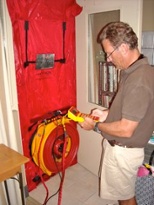The Future of HERS Rater Training and Building Science Education?

I’ve been involved in the home energy rating field since 2003 and have witnessed a lot of growth. When I went through the HERS rater class, there were only a handful of HERS rater training providers and maybe a couple dozen HERS rating providers. I counted 53 HERS training providers on the RESNET website just now, and there are probably more than 200 rating providers.
I’ve been involved in the home energy rating field since 2003 and have witnessed a lot of growth. When I went through the HERS rater class, there were only a handful of HERS rater training providers and maybe a couple dozen HERS rating providers. I counted 53 HERS training providers on the RESNET website just now, and there are probably more than 200 rating providers.
Even with all this growth, however, we’re still a tiny, niche industry. When demand for HERS rater training was at its peak in 2009, one of the original and most respected training providers (and where I was teaching the HERS class at the time) taught only 11 classes and fewer than 200 students. I don’t know the numbers for BPI trainers, but I suspect they’re similar.
I’ve written here before about the philosophy and methodology of HERS training classes, keys to success in green jobs education, how to choose a HERS rater class, the difficulty of the HERS rater test, and more. We taught our first HERS rater training class in August of this year and had a 100% pass rate on the HERS rater test, which I attributed to lengthening the class from 5 days to 8 days and reducing the pressure on HERS rater students.
Today, I’d like to take a longer view of this field and ask where we might be headed. If you look at the list of accredited HERS rater training providers, you may notice a few that are different from the rest. There are three educational institutions in the list.
HERS rater training began with nonprofit and for profit organizations that did environmental and energy efficiency work. Now the education community is starting to get involved, and I see this as a growing trend – and a good one. Community colleges and technical colleges have some advantages:
- They can spread the class out over weeks instead of just a few days. I’ve said in the articles mentioned above that I believe a 5 day HERS rater class is not enough time. An 8 day class is better but still isn’t enough. The brain needs time to absorb new information, and there’s a lot to absorb here.
- They’ve got the facilities and the resources that most HERS trainers don’t.
- The instructors usually have training and experience in how to educate students.
- When this trend becomes widespread, people interested in getting trained won’t have to travel as far.
The biggest reason this needs to happen, though, is that building science, home energy rating protocols, energy auditing skills, combustion safety, and all the other things we teach in HERS and BPI classes need to be a regular part of the curriculum for students taking classes in HVAC, construction, architecture, engineering, and related trades.
Plumbers and electricians need to know that when they cut a hole in the building envelope, it has an impact on how that building performs. HVAC techs should understand that heating and cooling efficiency includes the ducts. This isn’t something that’s just for environmental wackos. Everyone who touches buildings needs to know building science.
[I hope to get the chance to talk about a lot of these issues at the RESNET conference coming up in late February 2011. I’ve put in a proposal to present on HERS training with Scott Doyle of Energy Logic, and you can help us get selected by voting for our presentation. The number and title of our talk is below, and clicking it will take you to the voting site:
While you’re there, I hope you’ll also vote for the other presentation I’ve got nominated:
2011-179 Rating a Home for an Energy Improvement Mortgage, Start to Finish.]
This Post Has One Comment
Comments are closed.

Hey Allison, I voted for
Hey Allison, I voted for your proposals at RESNET.
RE: rating a home for an EIM. Would there be a different scope of work than for another objective?